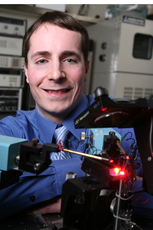Mar 3 2008
In recent years, light emitting diodes (LEDs) have begun to change the way we see the world. Now, a Rensselaer Polytechnic Institute student has developed a new type of LED that could allow for their widespread use as light sources for liquid crystal displays (LCDs) on everything from televisions and computers to cell phones and cameras.
 Martin Schubert, winner of the 2008 Lemelson-Rensselaer Student Prize
Martin Schubert, winner of the 2008 Lemelson-Rensselaer Student Prize
Martin Schubert, a doctoral student in electrical, computer, and systems engineering, has developed the first polarized LED, an innovation that could vastly improve LCD screens, conserve energy, and usher in the next generation of ultra-efficient LEDs. Schubert’s innovation has earned him the $30,000 Lemelson-Rensselaer Student Prize.
“In our community of innovators, the Lemelson-Rensselaer Student Prize recognizes our most inspired and dedicated students for their ingenuity and deep understanding of the greater global implications of their innovations,” said Rensselaer President Shirley Ann Jackson. “Martin Schubert is both a talented engineer and inspired entrepreneur. He launched his innovation not only because he had the engineering prowess, but because he also has a remarkable understanding of the technological, environmental, and energy saving outcomes his enlightened innovation will bring. Today we applaud him and the other finalists for their dedication and excellence, and we encourage them to continue to spark informed innovation around the world.”
Schubert is the second recipient of the $30,000 Lemelson-Rensselaer Student prize. The prize, which was first given in 2007, is awarded to a Rensselaer senior or graduate student who has created or improved a product or process, applied a technology in a new way, or otherwise demonstrated remarkable inventiveness.